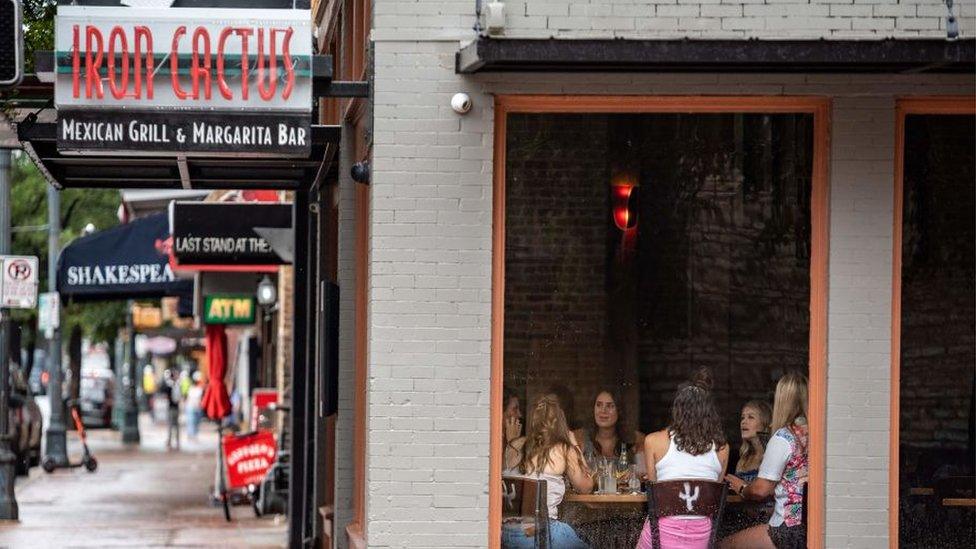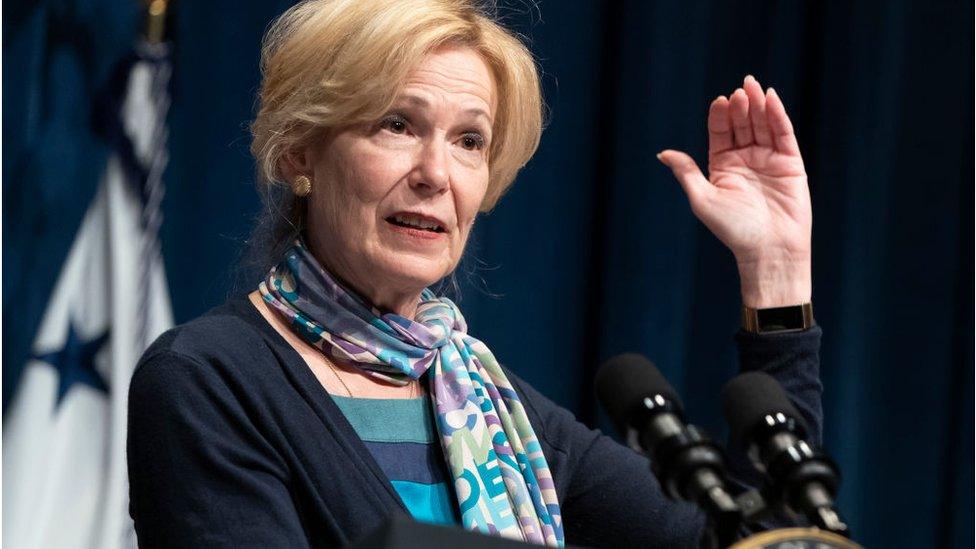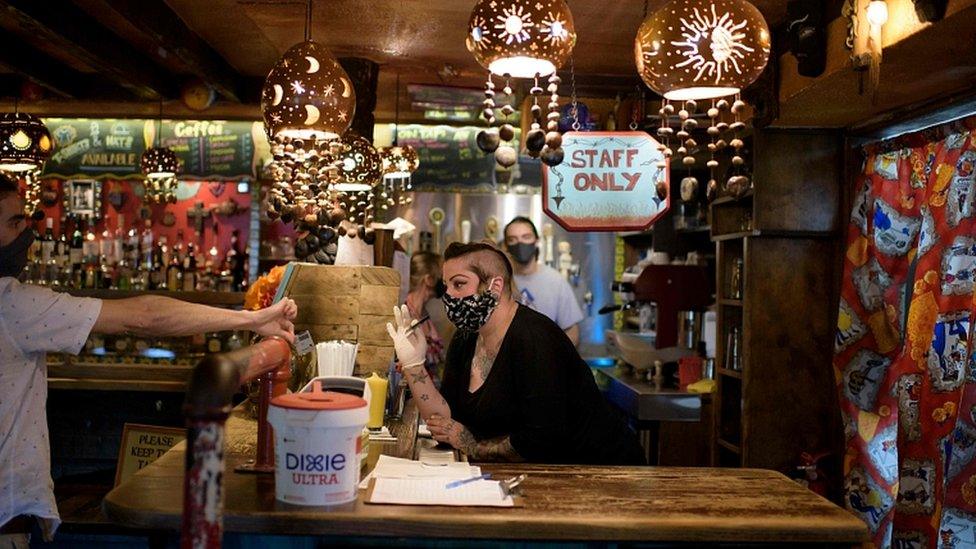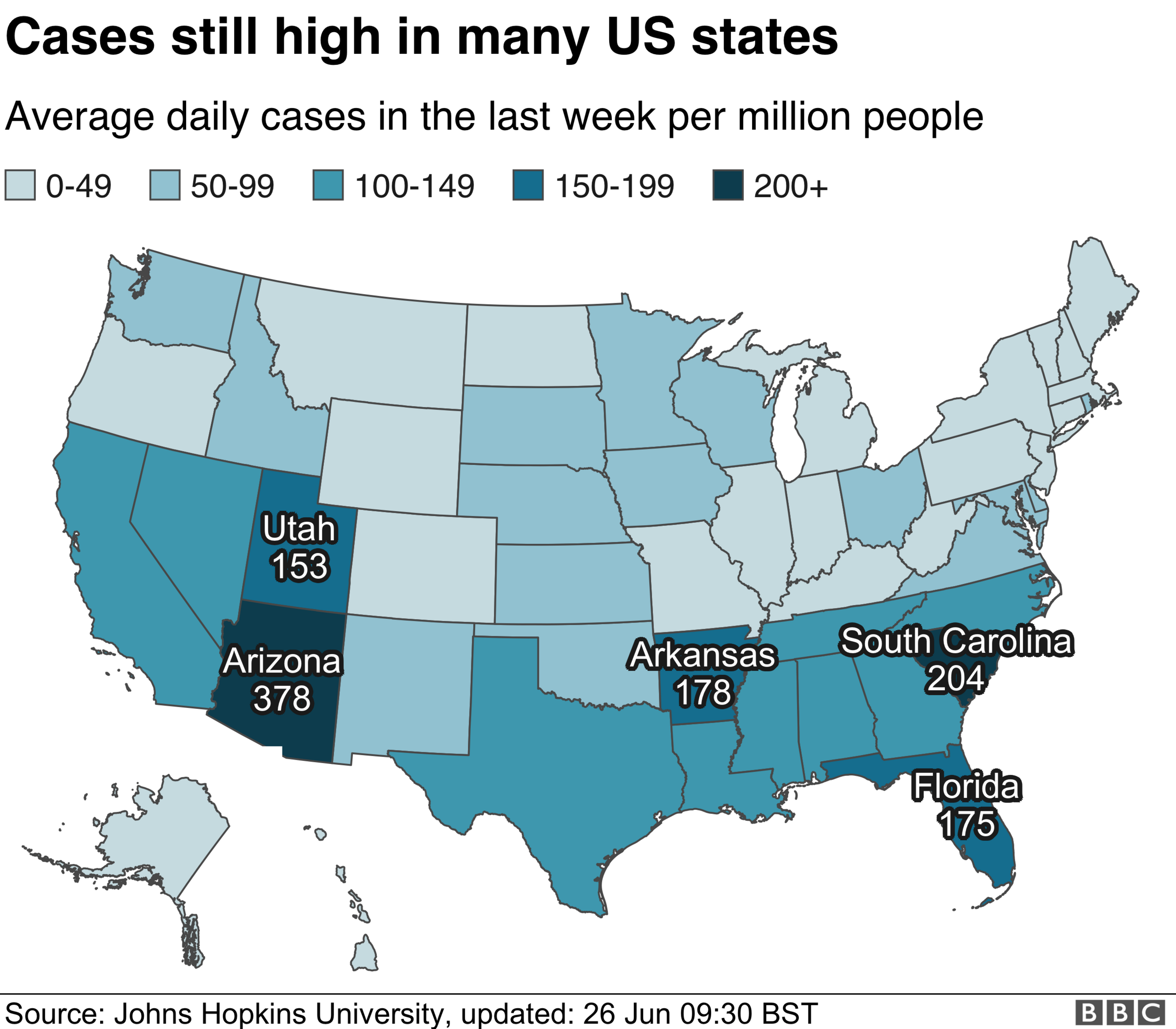Coronavirus: US has 'serious problem', says Fauci
- Published

Texas has seen a serious spike in Covid-19 cases
US infectious disease chief Dr Anthony Fauci says the nation has a "serious problem" as 16 states reel from a spike in Covid-19 cases.
At the first White House task force briefing in two months, Dr Fauci said: "The only way we're going to end it is by ending it together."
As health experts said more must be done to slow the spread, Vice-President Mike Pence praised US "progress".
More than 40,000 new cases were recorded across the US on Friday
The total of 40,173, given by Johns Hopkins University, was the highest daily total so far, exceeding the record set only the previous day.
There are over 2.4 million confirmed infections and more than 125,000 deaths nationwide - more than any other country.
During Friday's briefing, the White House task force also urged millennials to get tested, even if they are asymptomatic.
Mr Pence said the president requested the task force address the American people amid surges in infections and hospital admissions across southern and western states.
In Texas, Florida and Arizona, reopening plans have been paused due to the spike.
While some of the increase in daily cases recorded can be attributed to expanded testing, the rate of positive tests in some areas is also increasing.
Health officials in the US estimate the true number of cases is likely to be 10 times higher than the reported figure.
What was said at the White House briefing?
Dr Deborah Birx, coronavirus response coordinator, thanked younger Americans for heeding official guidance on testing.
"Whereas before we told them to stay home, now we are telling them to get tested."
She noted this "great change" in testing guidance would allow officials to find "the asymptomatic and mild diseases that we couldn't find before".

Dr Deborah Birx urged young people to get tested
Following Dr Birx's presentation of the recent data, Dr Fauci said: "As you can see we are facing a serious problem in certain areas."
He added: "So what goes on in one area of the country ultimately could have an effect on other areas."
Dr Fauci said the current rises were due to everything from regions "maybe opening a little bit too early", to opening at a reasonable time "but not actually following steps in an orderly fashion", to the citizens themselves not following guidance.
"People are infecting other people, and then ultimately you will infect someone who's vulnerable," he said.
"You have an individual responsibility to yourself, but you have a societal responsibility because if we want to end this outbreak, really end it... we've got to realise that we are part of the process."
Dr Fauci added that if the spread was not stopped, eventually even the parts of the country doing well now would be affected.
The vice-president, meanwhile, praised the nation's headway in handling the pandemic, noting "extraordinary progress" in former virus hotspots, like New York and New Jersey.
"We slowed the spread, we flattened the curve, we saved lives," he said.
Mr Pence also appeared to deny any link between states reopening and the increase in cases.
Responding to a reporter's question, he said the southern states that have reopened did so months ago, when new cases and rates were low.
Mr Pence instead blamed much of the rise on positive test results from asymptomatic young people, adding that while they may be at lower risk of serious symptoms, they should "take countermeasures" and listen to state governors' advice.
Florida residents push back on new face mask mandate

A difficult performance
Analysis by Tara McKelvey, White House correspondent
It was a tough week for the White House.
The number of cases has shot up in states where governors have tried to reinforce President Trump's message that the nation is returning to normal.
The spike in cases has alarmed many people, and Vice-President Pence expressed his condolences to those who lost loved ones. Then he hailed the Trump administration's "truly remarkable progress" in tackling the disease.
Critics found his positive spin on the situation jarring, given the dire news.
Pence has had a tough job from the start, supporting Mr Trump's controversial positions.
The vice-president's performance on Friday was an especially difficult - and, for many, unconvincing - one.

What's happening in the worst-hit states?
The US federal system of government allows states freedom to maintain their own public order and safety - even a national health crisis.
Governors have therefore been responsible for the varying degrees of lockdown put in place.
Texas, which has been at the forefront of moves to end lockdown measures, has seen thousands of new cases, prompting Republican Governor Greg Abbott to call a temporary halt to its reopening on Friday.
He announced that he was closing bars, stopping river-rafting, and ordering restaurants to return to 50% capacity to try to stem the outbreak.

Bars like this one in Houston have to close but could run deliveries or takeaway services
Texas confirmed a record 5,996 new cases on Thursday, while there were also 47 more deaths reported, the highest daily toll for a month.
On Friday, Florida broke its own daily record for new infections, reporting 8,942 new cases. The previous record was 5,508, reported on Wednesday. The state now has a total of 122,960 recorded cases and 3,366 deaths.
Earlier, Florida's governor said there was no plan to continue reopening step-by-step. "We are where we are. I didn't say we were going to go on to the next phase," Ron DeSantis told reporters.
Arizona has emerged as another epicentre of the crisis. Governor Doug Ducey, who had been giving businesses a "green light" to reopen, now says Arizona residents are "safer at home".
Other states, including Alabama, California, Idaho, Mississippi, Missouri, Nevada, Oklahoma, South Carolina and Wyoming, have all seen record daily increases in the number of confirmed cases this week.
Dr Fauci on Tuesday: 'We're now seeing a disturbing surge of infections'
New York, New Jersey and Connecticut have said they will ask people travelling from eight states - Alabama, Arkansas, Arizona, Florida, North Carolina, South Carolina, Texas and Utah - to go into self-isolation for 14 days.
California also reported a record number of new cases this week, with 7,149 confirmed on Wednesday.
Governor Gavin Newsom said the state had carried out more than a million tests over the past two weeks, with about 5% coming back positive. Mr Newsom has made wearing a face mask mandatory in public.



A SIMPLE GUIDE: What are the symptoms?
UPLIFTING STORY: '' I got a life-changing opportunity in lockdown'
POST-COVID WORLD: Will we ever shake hands again?
THE LOST SIX WEEKS: Missed chances for US to contain outbreak